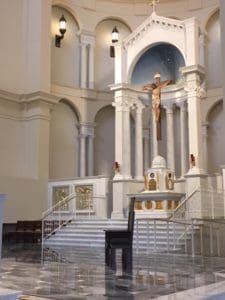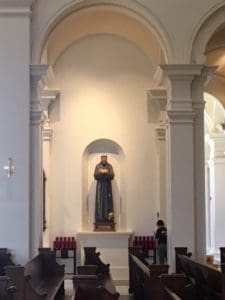The Eighteenth Sunday in Ordinary Time and the first Sunday in August is here. We share a Franciscan Gospel reflection and questions written by Fr. Paul Gallagher, OFM. They are edited by Franciscan Sister of Christian Charity Sister Anne Marie Lom and Joe Thiel. The excerpts from the Sunday readings are prepared by Joe Thiel. To read or download the complete pdf with excerpts for your prayer, please click here: Franciscan Gospel Reflection August 5 2018. Excerpts from the Lectionary for Mass for Use in the Dioceses of the United States of America, second typical edition © 2001, 1998, 1997, 1986, 1970 Confraternity of Christian Doctrine, Inc., Washington, DC. Used with permission. All rights reserved. No portion of this text may be reproduced by any means without permission in writing from the copyright owner. Please include this information when printing.
Photos: Holy Name of Jesus Cathedral, Raleigh, North Carolina
John 6:24-35
When the crowd saw that neither Jesus nor his disciples were there, they themselves got into boats and came to Capernaum looking for Jesus. And when they found him across the sea they said to him, “Rabbi, when did you get here?” Jesus answered them and said, “Amen, amen, I say to you, you are looking for me not because you saw signs but because you ate the loaves and were filled. Do not work for food that perishes but for the food that endures for eternal life, which the Son of Man will give you. For on him the Father, God, has set his seal.”
So they said to him, “What can we do to accomplish the works of God?” Jesus answered and said to them, “This is the work of God, that you believe in the one he sent.”
So they said to him, “What sign can you do, that we may see and believe in you? What can you do? Our ancestors ate manna in the desert, as it is written: ‘He gave them bread from heaven to eat.'” So Jesus said to them, “Amen, amen, I say to you, it was not Moses who gave the bread from heaven; my Father gives you the true bread from heaven. For the bread of God is that which comes down from heaven and gives life to the world.” So they said to him, “Sir, give us this bread always.” Jesus said to them, “I am the bread of life; whoever comes to me will never hunger, and whoever believes in me will never thirst.
Background
Last Sunday’s Gospel text was the first in a series of six gospel texts taken from John’s Gospel. Last week’s text recalled Jesus feeding the multitude with the bread and fish provided by a young boy in the crowd. (John 6:1-15) At the end of that text, John states that because Jesus knew that the crowd wanted to carry him off and make him their king, he withdrew to the mountain to be alone.
In the verses between last week’s Gospel and the text for this week, John describes the disciples’ encounter with Jesus walking on water. Jesus leaves them to go to the mountain alone, and the disciples decide to go to Capernaum in their boats. They encounter rough seas. After rowing for several miles they see Jesus walking on the water and they become afraid. Jesus reassures them that it is not a ghost but he himself. They then invite him to come into their boat. Instead of getting into the boat, Jesus goes to the shore, and they arrive there as well. (John 6:16-21) The following day the crowd returns and discovers that the disciples have left and there is only one boat missing. The question is raised about how Jesus has made the crossing. The crowd decides to travel to Capernaum in boats that have arrived from Tiberias. (John 6:22-23) This is where the gospel text for this Sunday begins.
When the crowds find Jesus, they call him Rabbi. Jesus teaches them as a Rabbi, quoting from the scriptures, “He gave them bread from heaven.” (Verse 31) Then he explains each word of the text. The three themes of this text are bread, sign, and work. Jesus is aware that they have come seeking more free bread. The typical person of the day had to labor a great deal for their daily nourishment. The day before, Jesus had supplied free bread to the vast crowd, so much free bread that the crowd could not eat it all, and perhaps they even carry away all that was left – twelve baskets full.
When they encounter Jesus again, they seem to be looking for more free bread. Jesus exhorts them not to work for bread that perishes, but for bread that the Son of Man will give them, bread that will last for a lifetime. This shifts the conversation from bread to work. “What kind of work is it that is required for this kind of bread?” the crowd asks. The response from Jesus is: “believe in the One that God has sent.”
This is not the belief that is a faculty of the intellect, like the belief in one God who is three persons. Rather, it is a kind of fidelity to another as an essential part of how one lives their life. This compares to believing in your spouse or a trusted friend.
The crowd asks for a sign to know that what Jesus is saying is indeed accurate. Jesus uses their request to teach them that it was not Moses but God who gave their ancestors the bread in the desert. It is also God who gives bread that gives life to the world. They ask for this bread. Then Jesus reveals that it is he who is the bread of life. In the typical style of Jesus’ teaching in John’s gospel, Jesus has used misunderstanding to draw the crowd further into what it is Jesus is trying to teach them. There is no sense that Jesus is trying to teach them about the nature of his presence in the Eucharist here.
Reflection Questions
1. If you were asked to list the things that you have worked the hardest for, your list would include…
2. When Jesus exhorts in the gospel not to work for the things that perish, you would like to respond…
3. Where in the last week would you see yourself as striving to accomplish the work of God?
4. Would you lean more toward believing that the Kingdom of God is God’s gift or that God has given us the tools to create the Kingdom by living the gospel values?
5. When you reflect on how Jesus used the people’s desire for bread to a deeper understanding of their relationship to God…
6. Can you talk with God about your desire for the Bread of Life, or what that phrase means for you, or how you see God proving life for you?




